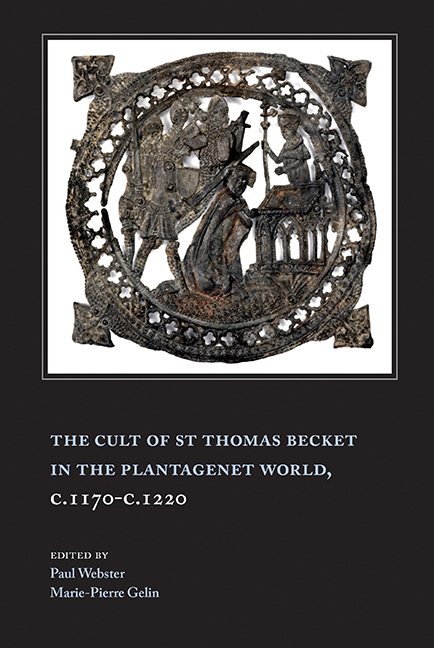Book contents
- Frontmatter
- Contents
- List of Illustrations
- List of Contributors
- Preface
- Acknowledgements
- List of Abbreviations
- 1 Introduction. The Cult of St Thomas Becket: An Historiographical Pilgrimage
- 2 Becket is Dead! Long Live St Thomas
- 3 The Cult of St Thomas in the Liturgy and Iconography of Christ Church, Canterbury
- 4 Thomas Becket and Leprosy in Normandy
- 5 Thomas Becket in the Chronicles
- 6 Matilda, Duchess of Saxony (1168–89) and the Cult of Thomas Becket: A Legacy of Appropriation
- 7 Leonor Plantagenet and the Cult of Thomas Becket in Castile
- 8 Crown Versus Church After Becket: King John, St Thomas and the Interdict
- 9 The St Thomas Becket Windows at Angers and Coutances: Devotion, Subversion and the Scottish Connection
- Bibliography
- Index
6 - Matilda, Duchess of Saxony (1168–89) and the Cult of Thomas Becket: A Legacy of Appropriation
Published online by Cambridge University Press: 25 October 2017
- Frontmatter
- Contents
- List of Illustrations
- List of Contributors
- Preface
- Acknowledgements
- List of Abbreviations
- 1 Introduction. The Cult of St Thomas Becket: An Historiographical Pilgrimage
- 2 Becket is Dead! Long Live St Thomas
- 3 The Cult of St Thomas in the Liturgy and Iconography of Christ Church, Canterbury
- 4 Thomas Becket and Leprosy in Normandy
- 5 Thomas Becket in the Chronicles
- 6 Matilda, Duchess of Saxony (1168–89) and the Cult of Thomas Becket: A Legacy of Appropriation
- 7 Leonor Plantagenet and the Cult of Thomas Becket in Castile
- 8 Crown Versus Church After Becket: King John, St Thomas and the Interdict
- 9 The St Thomas Becket Windows at Angers and Coutances: Devotion, Subversion and the Scottish Connection
- Bibliography
- Index
Summary
In 1168, Matilda, the eldest daughter of Henry II of England, married Henry the Lion of Saxony and Bavaria, and it is clear that Saxony in particular became a centre of Becket devotion noticeably quickly after Becket's death and canonisation. Evidence of autonomous female patronage is, however, frequently difficult to establish, with various acts, such as the foundation or endowment of religious houses, often being attributed in sources either solely to their husbands or as joint acts of patronage. This is particularly true for Matilda, duchess of Saxony, for whom no charters issued in her own name survive. She appears on just two of her husband's extant charters, both of which were issued in the early years of their marriage, and both of which concern religious donations. On the first of these, issued at Hertzburg in November 1170, Matilda gives her consent to a donation to the monastery of Northeim. She is only referred to on the second charter, recording the gift Henry made in 1172 of three candles which were to burn in perpetuity in the Holy Sepulchre at Jerusalem for, in Henry's words, ‘the sake of the forgiveness of all my sins and those of my famed wife Matilda, daughter of the glorious king of England, and those of my heirs given to me by God as a token of His mercy, and also for [the sake] of my whole lineage’.
The only other extant charter on which Matilda appears is that given by her son, Henry of Brunswick, in 1223, some thirty-four years after Matilda's death. In this charter, Henry describes his ‘dearest mother of most happy memory’ as the donor of the altar dedicated to the Virgin which stands in the church of St Blaise at Brunswick. As there is no record of Matilda as either the founder or the sole patron of any religious establishments during her lifetime – although it is almost certain that, together with her husband, she was a patron of the church at Brunswick and co-donor of the famous Gmunden Gospels – the mention of Matilda in her son's charter as the sole donor of the altar at Brunswick is of great significance for evidence of Matilda's patronage.
- Type
- Chapter
- Information
- Publisher: Boydell & BrewerPrint publication year: 2016



